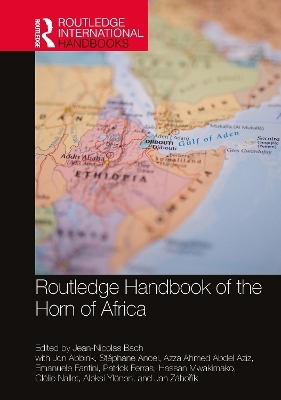
Routledge Handbook of the Horn of Africa
Routledge (Verlag)
978-1-138-35399-2 (ISBN)
The Routledge Handbook of the Horn of Africa provides a comprehensive, interdisciplinary survey of contemporary research related to the Horn of Africa.
Situated at the junction of the Sahel-Saharan strip and the Arabian Peninsula, the Horn of Africa is growing in global importance due to demographic growth and the strategic importance of the Suez Canal. Divided into sections on authoritarianism and resistance, religion and politics, migration, economic integration, the military, and regimes and liberation, the contributors provide up-to-date, authoritative knowledge on the region in light of contemporary strategic concerns. The handbook investigates how political, economic, and security innovations have been implemented, sometimes with violence, by use of force or by negotiation – including ‘ethnic federalism’ in Ethiopia, independence in Eritrea and South Sudan, integration of the traditional authorities in the (neo)patrimonial administrations, Somalian Islamic Courts, the Sudanese Islamist regime, people’s movements, multilateral operations, and the construction of an architecture for regional peace and security.
Accessibly written, this handbook is an essential read for scholars, students, and policy professionals interested in the contemporary politics in the Horn of Africa.
Jean-Nicolas Bach holds a PhD in Political Science and is affiliated at Sciences Po Bordeaux, Les Afriques dans le Monde, France. with Jon Abbink, Stéphane Ancel, Azza Ahmed Abdel Aziz, Emanuele Fantini, Patrick Ferras, Hassan Mwakimako, Clélie Nallet, Aleksi Ylönen, and Jan Záhořík.
1. General Introduction Part 1: Liberation Movements, Separatism, and States Formations 2. Understanding the Oromo Movements 3. The Ogaden National Liberation Front (ONLF) and the Dilemma of Liberation 4. Eritrea: Self-Reliance, Militarization, and Diaspora 5. The Sudan People’s Liberation Movement/Army 6. South Sudan after Secession 7. Sudan’s Challenge in Remaining a Cohesive Nation and State 8. Somalia: In Search of National Unity 9. The Somali National Movement: Engineering Self-Determination of Somaliland 10. Somaliland’s Struggle for Recognition since 1991 Part 2: Armed People, Conflicts and International Interventions 11. African Peace and Security Architecture (APSA) 12. The Military Equation in the Horn of Africa 13. The Horn of Africa and the Arabian Peninsula 14. Turkey’s Soft Power Experiments and Dilemmas in Somalia 15. Ugandan Interference in South Sudan 16. South Sudan: War, Peace Processes and Regional Economic Integration 17. Military Livelihoods and the Political Economy in South Sudan 18. Embedded Uniforms in Sudan 19. The Ethiopian National Defense Forces since 1991 20. Recruitment Strategies for Al-Shabaab in Kenya 21. ‘What is Happening Now is not Raiding, it’s War’: The Growing Politicisation and Militarisation of Cattle-Raiding among the Western Nuer and Murle During South Sudan’s Civil Wars 22. The War in Tigray (2020-2021) Part 3: Authoritarianism, Innovative Regimes, and Forms of Resistances 23. Ruling over Diversity: Federalism and Devolution in Ethiopia and Kenya 24. State Power and Citizen Agency: Reframing the Power Narrative in State-Society Relations in Ethiopia 25. Being a de facto State is not Enough: Somaliland’s Innovative Regime 26. The Politics of State-Building: Regime Restructuring in Mogadishu 27. The Looming Spectre: A History of the ‘State of Emergency’ in Ethiopia, 1970s-2021 28. Thirty Years of Autocratic Rule: Eritrea's President Isaias Afwerki Between Innovation and Destruction 29. Authoritarian Adaptation and Innovative Contestation in Sudan, 2009-2019 30. Hegemonic Elections: Ethiopia, Sudan, Djibouti 31. Serving the Regime: The State Police and Kenya’s Electoral Authoritarianism 32. Women, Clan and Politics in Somalia 33. Sudan: the December 2018 Revolution and its Aftermath 34. The Sudanese ‘Transition’ Seen From its Peripheries, 2018-2020 Part 4: Religion and Religious Movements: Strategies and Adaptation to New Landscape 35. Political Islam in Somalia 36. Islam, Politics, and Violence on the Kenya Coast 37. The ‘Islamic movement’ in Sudan 38. Islamic Law, Legal Hybridity and Legal Practices in Sudan 39. ‘For God and my Country’: Religious Lobby Groups in Uganda and their Role in Policy Making 40. The Civil Rights Movement of Ethiopian Muslims in 2012 41. The strains of ‘Pente’ Politics: Evangelicals and the Post-Orthodox State in Ethiopia 42. Architectural Innovation of Ethiopian Orthodox Church 43. Singing in Praise of Jesus in an ‘Islamic State’ Part 5. People’s Movements: Migration 44. Producing Migrants as Entrepreneurs in Sudan 45. Domestic Labour and Immigration into the Republic of Djibouti by Young Ethiopians and Somalis 46. Migration within the Horn of Africa 47. Migration, Asylum and International Interventions 48. Girls on the Move: Changing Dynamics of Migration in the Horn of Africa 49. Migration is a Personal Journey: Stories of Ethiopian and Eritrean Migrants as they Forge Their Individual and Collective Journeys and Existence in and out of the Region 50. Multi-Directional Movement and the Management of Mobility Between Ethiopian and Eritrean (1993-2020) 51. Sedentarization of Cross-Border Tribes and Mixed Migration Movements 52. Ethiopian Diaspora and Its Impact on Politics in Ethiopia 53. Qof Ma Dhiban: Somali Orality and the Delineation of Power Part 6. Connecting the Horn: Infrastructures, Investments and Networks 54. Geopolitical Challenges for the Development of Hydroelectricity in the Nile Basin 55. Water, Land and Arab Investments in Irrigation Projects 56. Demystifying the National Interest: The Case of Building Dams and Dismantling the Sudanese State 57. China and the African Union 58. China’s Information Infrastructures in the Horn 59. Oil and Gas in East Africa 60. Inconspicuous Economic Integration by Small Transnational Entrepreneurs in Uganda and South-Sudan
| Erscheinungsdatum | 21.01.2020 |
|---|---|
| Reihe/Serie | Routledge International Handbooks |
| Zusatzinfo | 17 Tables, black and white; 20 Line drawings, black and white; 5 Halftones, black and white; 25 Illustrations, black and white |
| Verlagsort | London |
| Sprache | englisch |
| Maße | 174 x 246 mm |
| Gewicht | 1600 g |
| Themenwelt | Naturwissenschaften ► Geowissenschaften ► Geografie / Kartografie |
| Sozialwissenschaften ► Politik / Verwaltung ► Vergleichende Politikwissenschaften | |
| Sozialwissenschaften ► Soziologie ► Spezielle Soziologien | |
| ISBN-10 | 1-138-35399-X / 113835399X |
| ISBN-13 | 978-1-138-35399-2 / 9781138353992 |
| Zustand | Neuware |
| Informationen gemäß Produktsicherheitsverordnung (GPSR) | |
| Haben Sie eine Frage zum Produkt? |
aus dem Bereich


